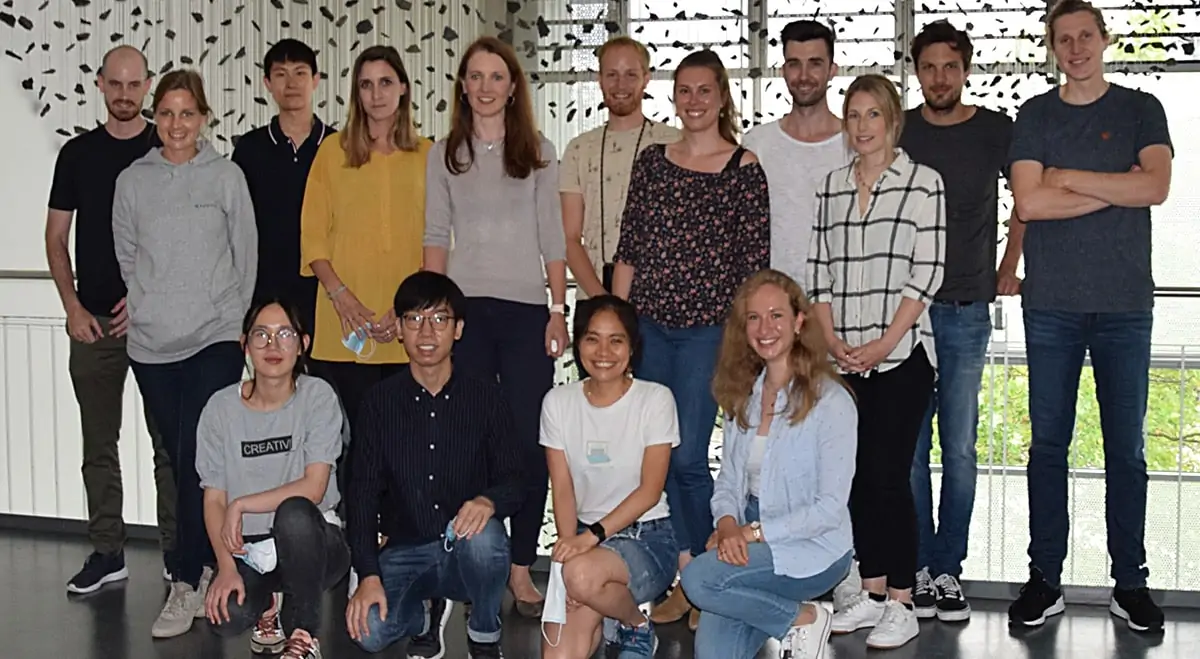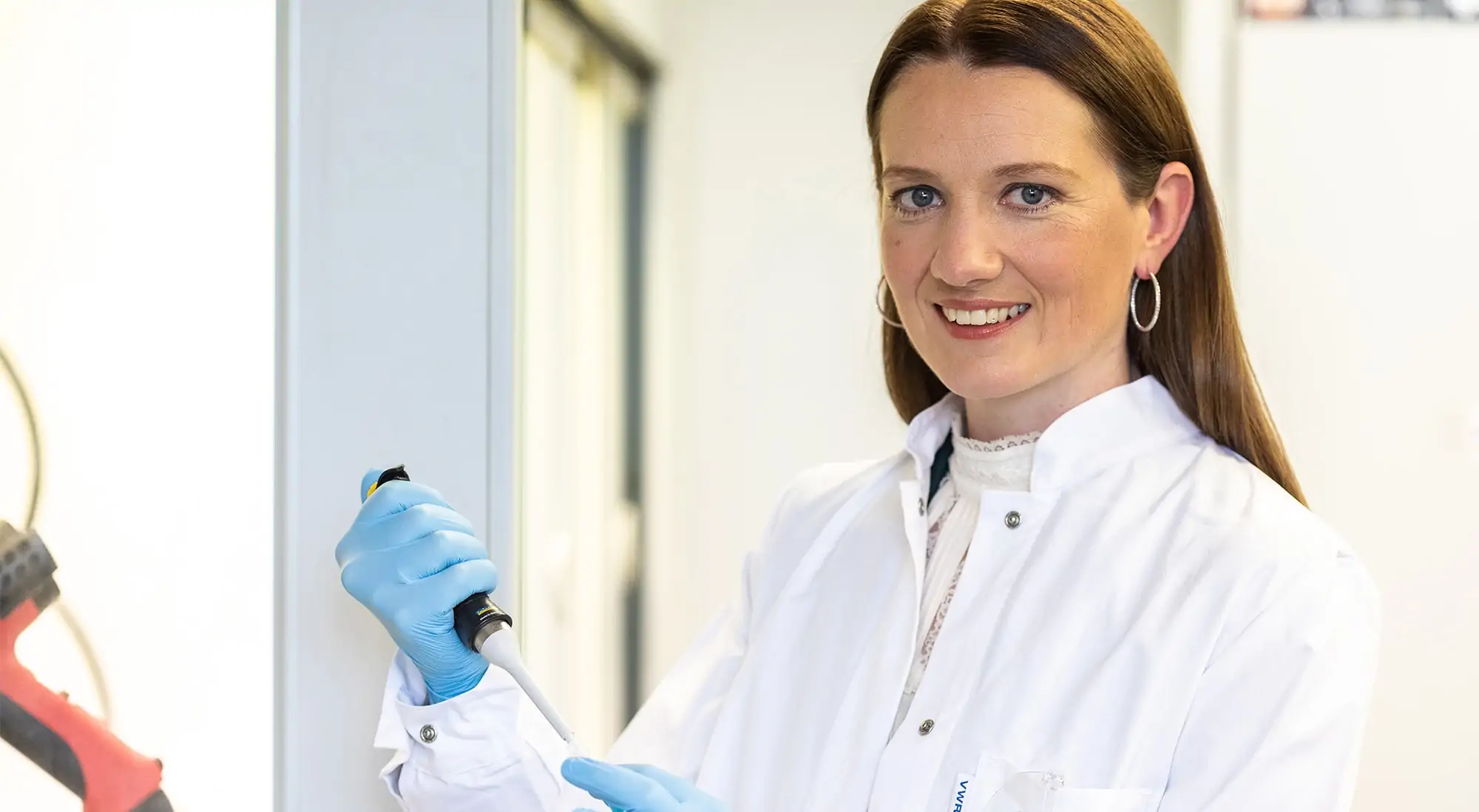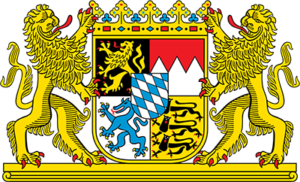Prof. Olivia Merkel is developing revolutionary RNA transport systems
Highest international awards for one of the youngest professors in Germany
November 2021
© IZB
Research presentation by Prof. Oliva Merkel at the IZBrunch in September 2021 at the Innovation and Start-up Center Biotechnology (IZB) in Martinsried by Munich
“The focus of our research is on local delivery of drugs, genes, mRNA and siRNA with emphasis on pulmonary delivery for applications in cancer immunology, inflammatory diseases and respiratory viruses.”
Prof. Olivia Merkel
If you look at her CV, and above all, all the positions she has already held, it is difficult to imagine that Prof. Olivia Merkel started her career as one of the youngest professors in Germany. Her research focus is on the development of targeted pulmonary RNA transport systems that are used in cancer, infectious as well as inflammatory diseases, and also in the future with COVID-19. Her research is currently funded by an ERC grant from the European Research Council, the Bavarian Research Foundation, the Volkswagen Foundation, Daiichi-Sankyo Europe, and AbbVie. Her research work has already been recognized by many international awards.
Prof. Dr. Olivia Merkel has received, among others, the PHOENIX Pharmacy Award, which recognizes innovative and outstanding work in pharmaceutical research. The list of awards is long: for example, she received the Princess Therese von Bayern Prize, an ERC Starting Grant, the Young Pharmaceutical Investigator Award from the European Federation for Pharmaceutical Science, and the German Carl Wilhelm Scheele Prize of the Pharmaceutical Society (DPhG), and the award for the best PhD thesis at the Philipps University of Marburg. She also received an invitation to the Lindau Nobel Laureate Meeting. In 2020 she was President of the German Society for Controlled Release (CRS) and is Chair of the CRS Focus Group Transdermal and Mucosal Delivery.
In parallel, she also became a mother and mastered the lockdown with a toddler. However, it wasn’t easy. “In the Corona crisis, we university lecturers were completely forgotten,” says Prof. Merkel looking back. Only by consistently working at night did she manage this phase and for the first time in her life felt disadvantaged as a woman. Susanne Simon interviewed her about her work for “IZB Biotech News”.
At the age of 34 you received a professorship at the LMU in Munich. How did that happen?
Actually, I created this position myself. At the age of 29 I started a tenure-track professorship in pharmacy at Wayne State University in Detroit, USA, and was able to carry out research there for six years. I was also a lecturer in oncology at this university and am still a scientific member of the Molecular Therapeutics Program and lecturer in the Cancer Biology Graduate Program at the Barbara Ann Karmanos Cancer Institute in Detroit.
In 2014, I applied in Brussels for the ERC Starting Grant on the subject of “Novel Asthma Therapy” to develop targeted pulmonary siRNA transport to activate T cells in the lungs using a dry powder platform technology. In fact, when this was accepted, I received research funding of over two million EUR and then started looking for a university. I was actually offered a position at the Technical University in Graz. However, the position there was temporary. So I applied to the École Polytechnique Fédérale de Lausanne (EPFL). They would have liked to welcome me there, but Switzerland voted against the mass immigration law in 2014 and was therefore not allocated any EU funds that year.
Then I stood there with my two million EUR and looked again. I chose the Ludwig Maximilian University in Munich. The colleagues there were very committed and created a professorship especially for me, since I was formally not part of the ERC incentive professorship scheme. As a transition, I first decided on a half position as a substitute professor, which I then took on full-time in October 2016. So from 2015 to 2017 I commuted between the research laboratories in Munich and Detroit. I was later followed by three German medical students from Detroit as PhD students in my laboratory in Munich.
Prof. Merkel, what exactly is your research area?
Since 2015 I have been Professor of Drug Delivery in the Pharmacy Department at the LMU in Munich. My team and I focus on novel, non-viral and targeted nanoscale RNA transport systems. We are particularly interested in the local delivery of drugs, genes, mRNA and siRNA with a focus on administration through the lungs.
These applications are used in cancer immunotherapy, and infectious and inflammatory diseases. Since the COVID-19 crisis, we have also been increasingly active in the development of therapeutic and prophylactic approaches to treating viral respiratory diseases. After all, COVID also has an inflammatory origin.
Our goal is also to develop better asthma therapy that combats the cause of the disease, not just the symptoms. Moreover, the technology is also of great importance for T-cell therapies in other disease areas.
In principle, we are creating the “bus” for nucleic acids. This means that we receive the medication and package it in an effective formulation that can be administered as a tablet, capsule, or now also as a dry powder for inhalation or nebulization (nanoparticle suspension). The big advantage: stabilization is very high, since the powder does not need cooling, but can be stored at room temperature. We thus avoid chemical, physical and microbiological instability.

© LMU Munich
The Merkel lab is based in the Department of Pharmacy at LMU Munich and focuses on novel non-viral and targeted nanosized RNA delivery systems.

© LMU Munich
Prof. Olivia Merkel, LMU Munich, Department of Pharmacy
How were you able to maintain the professorship in Detroit despite your work in Munich?
I had a very good team of five PhD students who took over the work there and who regularly discussed things with me in weekly Skype meetings. The technical set-up was excellent, since we had a camera on the ceiling that covered the entire room. Our group meetings always took place at 9 am in the USA and at 3 pm in Munich. That worked out very well. Since I commuted about once a month until my late pregnancy, I was able to continue to supervise both groups personally.
How were you able to combine having a child with being a professor?
Fortunately, I was able to get my last PhD student in Detroit graduated four days before my son was born. So after that I only had one laboratory to take care of. Our family situation was rather chaotic at the time, since my husband was still in Detroit and then moved to Switzerland. We moved five times between November 2017 and May 2018. When I was on parental leave, I mainly worked at night. Thanks to the excellent collaboration with my two group leaders at the time, the PhD students were always well looked after.
How was your experience during the corona lockdown from March 2020?
That was a really exhausting time and extremely stressful for me. The government completely forgot about university lecturers during this time. As a pharmacist working in research, I was not entitled to emergency care for our son, although I worked on three COVID projects during the first lockdown and took the second state examination in pharmacy to ensure the supply of pharmacists. The species professor and mother is apparently still very rare, which is why I fell through the grid here. Since a two-year-old toddler does not look after himself, I mainly worked during his afternoon nap and at night. During this time, as general lecturer activities I also organized extensive corona administration, recorded my lectures, and supervised twelve PhD students. Since the students were not allowed to go to the laboratory for eight weeks, I created topics that they could do as home office work.
Before this crisis, I never felt disadvantaged as a woman. Since then, I’ve seen things a little differently. My male colleagues used the time to submit applications, finalize manuscripts and intensify communication by email. Sometimes my patience has been stretched beyond the limit. Only in June was I able to use the emergency care in daycare due to my COVID research. Overall, I have largely tried to block out the year 2020 because the time pressure was enormous.
You speak five languages. Were you bored at school?
Yes, that’s certainly true. While on vacation in Turkey, this language appealed to me so much that I went to evening classes to learn the language. I love talking to people in their language. Since my husband is Italian, we speak Italian with our son, the two of us continue to talk to each other in English out of habit, I communicate with my child in German, and in French-speaking Switzerland, where my husband has lived for the last few years, we talk in French. A waiter once looked at our son with pity and asked if he had to grow up speaking four languages. But for him that’s not a problem, because he also has a Spanish girlfriend in the kindergarten.
Did your son inherit your photographic memory?
I think he has indeed inherited something from me. At the age of 1 ½ he loved to play for hours with the numbers on the hotel safe when he was with me at a congress. He also knew all the speed limits on our routes by heart, and now aged 4 is a fan of percentage calculations.
What advice would you give young women scientists?
You should always believe in yourself and never let yourself be discouraged by unfair blows. It is also important to get help in order to move forward. I was made fun of for my nanoparticles for a long time. Today everyone is vaccinated with these molecules as part of the corona vaccination. Driving an idea forward brings success, even if you repeatedly fail. Of course, realistic assessment is important. If 99 percent of people say the procedure won’t work, you should think very carefully. But if the ratio is 50/50, you should pursue your goals. A good example of this is Katalin Karikó, a Hungarian biochemist who also lived in the USA for a long time. Her research focuses on RNA-mediated immune activation. Together with the American immunologist Drew Weissman, she discovered the possibility of suppressing the immunogenicity of RNA through nucleoside modification. This technology enables the therapeutic use of mRNA and formed the basis for developing mRNA-based COVID-19 vaccines (RNA vaccine). She believed in herself.
What is your goal for the next five years?
We want to start a clinical study on formulations based on our technology within the next five years. In addition, the therapeutic agent should be accessible to other organs, not just the liver, since our goal is to use new administration routes for the body.
Prof. Olivia Merkel received the PHOENIX Pharmaceutical Science Award on December 9, 2020, which recognizes innovative and outstanding work in pharmaceutical research and is endowed with a total of 40,000 euros.
Prof. Dr. Olivia Merkel, Department Pharmazie
Ludwig-Maximilians-Universität München
Butenandtstr. 5-13, Haus B
81377 München
Telefon: +49 89 2180 77025
E-Mail: ed.nehcneum-inu.puc@lekrem.aivilo
www.cup.lmu.de/pb/aks/merkel




